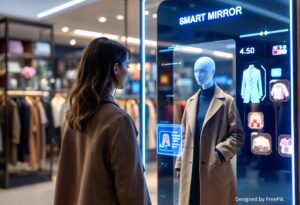Retail software for stores —Managing multiple stores means juggling inventory, data silos, and inconsistent customer experiences. The introduction of retail software has alleviated this problem. The global retail enterprise software market was valued at $44.59 billion in 2024, with a projection of approximately $87.1 billion by 2030, growing at a CAGR of around 12.1%. (Grand View Research) This suggests the immense demand for retail software in the market today, with most major retailers looking to upgrade their enterprise retail software to stay resilient.
For retailers managing tons of complex data to keep their stores running smoothly, this signals a major opportunity to adopt software like cloud-based retail POS systems that can future-proof their retail business, especially in competitive markets like Southeast Asia, which is undergoing a digital revolution.
What is Retail Software for Multi-Store Retailers?
Key Features of Modern Retail Software
Retail operations have evolved rapidly with the advent of technology to assist retailers in carrying out increasingly complex tasks. From the initial pen-and-paper tracking to Excel sheets and now fully automated systems that handle sales and customer information effortlessly, the retail landscape has changed drastically in the past few decades. Some features of modern retail systems are as follows:
- Cloud-enabled: Enables centralised data that is updated in near real-time
- Smart Reporting: Insights on every aspect of retailers’ retail business
- Multiple integrations: Allows retailers’ different applications to communicate with each other
- Scalable: Can be easily scaled as a retailer’s business grows
Learn more about how retail POS systems have evolved to the robust solutions they are today here.
Common Types of Retail Software
- Inventory Management Software: Allows retailers to keep track of their inventory across stores, which is especially critical for fashion retailers balancing stock across boutiques and e-commerce
- Stock Optimisation Software: Helps lifestyle chains avoid overstock in one store while another faces shortages
- Customer Relationship Management: Retail CRM software helps luxury retailers deliver VIP experiences and long-term loyalty
- Sales Tracking: Keeps track of retailers’ sales and allows them to view segmented data by store and product
- Loyalty software: Allows retailers to implement loyalty programmes for loyal customers, increasing the retention rate
- POS software: Helps global retailers manage sales transactions, track inventory, payments, and receipts.
While these may seem like a lot of solutions for a single retailer to have, they ensure the smooth running of stores. Modern unified commerce platforms, like Cegid Retail, offer many of these functionalities built into one system, creating a single system that fulfils many of these functions. This makes it easier for retailers as they only have to implement a single system.
Choosing the right POS system is crucial for multi-store retailers— see our buying guide here.
6 Benefits of Retail Software for Chain Retailers
1. Improving Operational Efficiency
By automating the processes for repetitive tasks such as stock taking, retailers can free up their employees for higher-value tasks such as interacting with customers while reducing errors.
2. Increased Data Visibility
Through the adoption of retail software, retailers can obtain a better understanding of their retail data, such as their best-selling products based on geography and season. This allows retail leaders to make data-driven decisions, taking the guesswork out of their business processes.
3. Enhanced Customer Experience
Allows retailers to understand their customer data better and build personalised offers and loyalty programmes based on customer segmentation. This increases the retention rate and can increase the average basket size of customers.
4. Omnichannel Consistency
Offers a seamless shopping experience across channels, whether in-store, online, through a mobile app or a pop-up store, allowing retailers to reach customers wherever they are and boosting sales for the business.
Adopting an omnichannel strategy is essential for multi-store retailers. Learn more about what an omnichannel retail management system is here.
5. Improved Scalability
Retail software allows retailers to scale to new stores and markets with ease through the integration of data across various stores. It allows retailers to adapt to changing consumer tastes and market conditions, improving agility.
6. Sales and Marketing Analytics
Offers insights into sales performance, inventory trends and customer preferences to refine strategies and improve engagement. Based on this data, retailers can optimise their marketing campaigns based on the specific store data.

A picture of a woman in a brown coat looking at a magic mirror screen with options for clothes on a retail software
Be Prepared for the Future of Retail
Top retailers are consistently upgrading their retail software as the technological landscape evolves rapidly. Consumers’ expectations are higher than ever, and they expect a seamless and integrated shopping experience across all channels. To grab a piece of the pie, retailers must be innovative and agile in how they approach their business.
Recent emerging technologies, such as AI, are also accelerating the pace at which retailers are adopting different applications to optimise their stores. Some examples include:
- Magic Mirrors: AI and computer-vision driven technologies that allow for personalised advertisements according to gender and age, based on the person standing in front of them.
- Generative AI-based smart storytelling: Generative AI chatbots that act as an omniscient sales assistant that assist with customer queries in real-time.
- Smart Stock Optimisation: AI analyses and recommends the best combination of store transfers to ensure that retailers’ stock levels are just right at every store.
- Predictive Analytics: AI analyses historical data, identifies complex patterns and makes highly accurate predictions about future sales.
- Integrated AI agents in POS systems: Automate routine store tasks like scheduling and reporting across countries, providing instant, actionable insights to optimise retail operations in real time.
Bring Your Business to the Digital Forefront with Retail Software
Adopting retail software is not just about automating tasks; it can transform entire businesses. For enterprise retailers, retail software unifies operations, strengthens customer loyalty, and drives growth. It allows retailers to be:
- Agile: Easily adapt to any market changes that arise
- Scalable: Retail software can be a driver for growth and allow retailers to scale with ease
- Future-proof: Allows retailers to integrate up-and-coming technologies into their business with ease
If you are a retailer looking to adopt retail solutions to boost your business operations, contact us today! Speak with one of our retail experts to find out how you can grow and future-proof your business.

